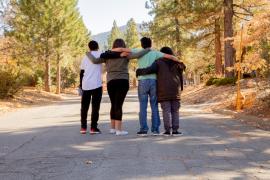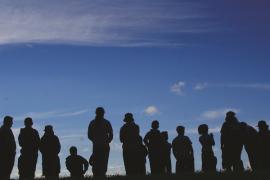Working at camp is one of the most memorable experiences a person can have; in fact, you are likely reading this because you have worked at camp in the past and are returning for more, or you are preparing to work at camp for the first time. Whatever your story, chances are you have had a positive experience at camp as a kid and are now looking to continue that experience by working at camp.
You are not alone. Each year, camps hire, on average, 239,085 seasonal staff members, most of whom serve as camp counselors or program staff (American Camp Association, 2016). A large percentage of seasonal staff return to work at camp at least once — a typical camp reports 60 percent returning staff (American Camp Association, 2017) — suggesting camp work is not only fun, but beneficial in some way. Research suggests that working at camp:
- Promotes social-emotional learning, such as self-awareness and relationship skills (Owens & Wahle, 2018) , as well as problem solving and critical thinking (Martin & Strom, 2017)
- Helps emerging adults practice responsibility (Ferrari & Risch, 2013)
- Represents what many colleges and universities call a “high impact learning opportunity” (Browne, Michelotti, Friedman, & D’Eloia, 2016)
- Provides important workforce development skills (Duerden, Witt, Garst, Bialeshcki, Schwarzlose, & Norton, 2014)
- Is a transformative experience (Garst, Franz, Baughman, Smith, & Peters, 2009)
But, if you’ve worked at camp before, you probably also know how these benefits all too easily get lost with the demands of resume-building (and high-paying) internships, extended academic calendars, and the time-worn demand to “just get a real job.” You’ve likely felt these pressures from parents, teachers, and advisors, and now we are feeling these pressures as an industry as camps across the country increasingly struggle to find and retain qualified staff (American Camp Association, 2017b).
Luckily, we are more prepared to face these challenges than ever before because we have new evidence that working at camp promotes not only valuable skills, but skills that transfer beyond camp to contexts such as school and career. This evidence is the first of a series of findings from ACA’s Impact Study, a multiyear research project conducted in partnership with researchers at the University of Utah that will explore if and how camp experiences prepare campers, CIT/LITs, and staff to thrive in college, in their careers, and in their lives outside of camp. Although preliminary, these findings suggest that camp experiences foster unique and lasting learning experiences that play an important role later in life.
Research on the long-term benefits of working at camp has begun, and we anticipate these findings will tell a similar tale, namely that working at camp prepares camp staff to thrive in college, in their early careers, and in their emerging adult lives. In the meantime, though, preliminary findings on camper outcomes are promising, and you can use these findings in your work at camp and as you translate your work on your resume (or, for that matter, for anyone telling you to get a “real job”).
Tell the world you are in the business of preparing kids to thrive in college, in their careers, and beyond. Early themes from the Impact Study suggest that kids learn relationship skills, they learn how to appreciate and respect people who are different from them, and, at overnight camps, they learn how to live successfully in small groups and away from home. In this study, former campers shared things like “Going to camp with so many different campers where I had no idea who they were, where they came from, or how much money their parents made was something that helped me early in my life because I understand it doesn’t matter how different we are. Camp made me realize that you can be friends or hang out with anyone and form relationships with anyone that you might not think that you would.”
What can you do with this? You can tell others that the work you do at camp is more than just fun and games. In fact, you can tell them you intentionally design activities (that are most certainly fun) that lead to lasting learning. You are a facilitator and a mentor, and in this role at camp, you help kids learn how to make friends, how to appreciate people’s differences, and how to be independent. We use the term “social-emotional learning” to describe outcomes like these, and you should too: You are in the business of building the next generation of healthy, active, and contributing adults.
Help campers to see they are learning how to be independent and responsible at camp. These were two strong themes from the initial phase of the Impact Study that suggest the schedules and routines you promote at camp are actually powerful learning opportunities for your campers. Former campers described using these skills as they navigated their first jobs and in their first years of college, for example: “At camp, you always had some sort of job or chore, and it taught me a little bit more responsibility than I had before I went. I was a waitress and a busgirl, so I had to clean up, and being at camp, you had to clean up your own mess. That definitely helped with my job.”
What can you do with this? You can find small ways to celebrate campers when they successfully manage a packed camp schedule, tackle their chores without being asked, or keep their things organized. Your understanding of what campers will eventually take away from camp, and your ability to help campers see what they are learning in real time, will ensure those things stick. These findings suggest that learning occurs at camp outside of activities as much as it does during activities, so look for opportunities to acknowledge the important ways campers are learning at all times during the camp day.
Know you are likely one of the most important factors in making this learning happen. The Impact Study research team asked former campers not only what they learned at camp, but what happened at camp to make that learning happen. Not surprisingly, meaningful interactions with caring, compassionate staff with whom campers identify was one of the most common themes. One former camper said, “I was bullied quite a bit, and I would love summer because I wouldn’t be at school. Camp was that escape to get through that and be somewhere that was safe. I mean just being at a summer camp helped kids get through those times and helped them know that they weren’t alone. I had some really great counselors growing up that helped.”
What can you do with this? This is a finding that should make you feel really good about your role at camp, and maybe a little intimidated too. These initial findings tell us that camp staff play the important role you do because you are people campers can identify with; you are close enough in age that campers can see themselves in you, and can aspire to be like you someday. You should keep this in mind as you interact with campers and when you describe your camp work experience on your resume. Want more research-based information on how to make sure your interactions with campers consistently promote positive experiences? Check out the Camp Program Quality Assessment Checklist (American Camp Association, 2018), which outlines specific behaviors such as speaking with campers at their level and using their first names. You can find the checklist here: ACAcamps.org/resource-library/research/camp-program-quality-assessment-c-pqa.
Most importantly, know that the work you do is real, and we have solid evidence that suggests the work you do at camp makes a difference in kids’ lives, now and in the long term. This is research you can use to guide your work at camp and to demonstrate to others that your work has tremendous value, both for you and for the kids you serve.
References
American Camp Association. (2018). Camp program quality assessment (C-PQA). ACA. Retrieved from ACAcamps.org/resource-library/research/camp-program-quality-assessment-c-pqa
American Camp Association. (2017). Staff enrollment report 2017. ACA. Retrieved from ACAcamps.org/sites/default/files/resource_library/2017_StaffRecruitmentReport.pdf
American Camp Association. (2017b). 2017 emerging issues survey data and analyses. ACA. Retrieved from ACAcamps.org/sites/default/files/resource_library/2017-Emerging-Issues-Full-Report.pdf
American Camp Association. (2016). Compensation, benefits, and professional development survey. ACA. Retrieved from ACAcamps.org/resource-library/research/compensation-benefits-and-professional-development-report
Browne, L., Michelotti, C., Friedman, N., & D’Eloia, M. (2016). What do engaged staff say, feel, and do? 2016 American Camp Association Research Forum Abstracts, pp. 8–10. Retrieved from ACAcamps.org/sites/default/files/resource_library/2016-National-Research-Forum-Book-Abstracts.pdf
Duerden, M. D., Witt, P., Garst, B., Bialeshcki, D., Schwarzlose, T., & Norton, K. (2014). The impact of camp employment on the workforce development of emerging adults. Journal of Park and Recreation Administration, 32(1).
Ferrari, T. M., & Risch, L. (2013). Exploring 4-H camp counseling as a context for developing responsibility. 2013 American Camp Association Research Forum Abstracts, pp. 21–24. Retrieved from ACAcamps.org/sites/default/files/resource_library/2013-National-Research-Forum-Book-Abstracts.pdf
Garst, B. A., Franz, N. K., Baughman, S., Smith, C., & Peters, B. (2009). Growing without limitations: Transformation among young adult camp staff. Journal of Youth Development, 4(1), 21–34.
Martin, K. L., & Strom, M. J. (2017). Summer camp staff: A real job with real world implications. 2017 American Camp Association Research Forum Abstracts, pp. 22–25. Retrieved from ACAcamps.org/sites/default/files/resource_library/2017_ACA_Book_of_Abstracts.pdf
Owens, M., & Wahle, A. (2018). Camp leaders’ work-related experiences for social emotional learning. 2018 American Camp Association Research Forum Abstracts, pp. 40–42. Retrieved from ACAcamps.org/sites/default/files/resource_library/2018%20Book%20of%20Abstracts_searchable%20%281%29.pdf
Laurie Browne, PhD, is ACA’s director of research. She specializes in ACA’s Youth Outcomes Battery and supporting camps in their research and evaluation efforts.


